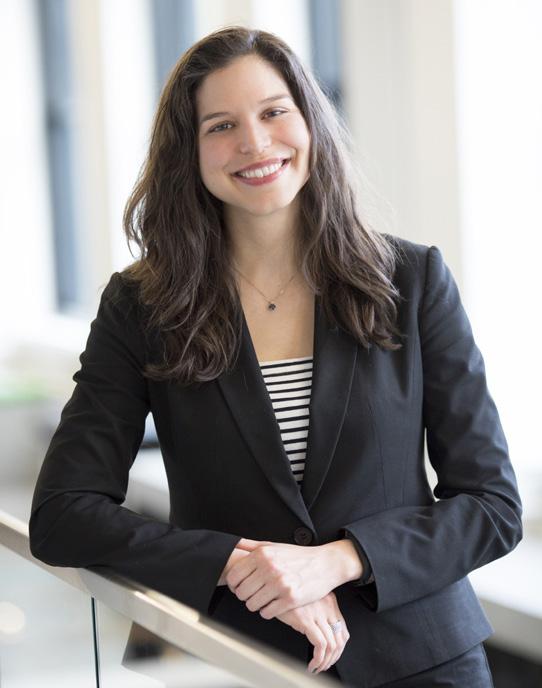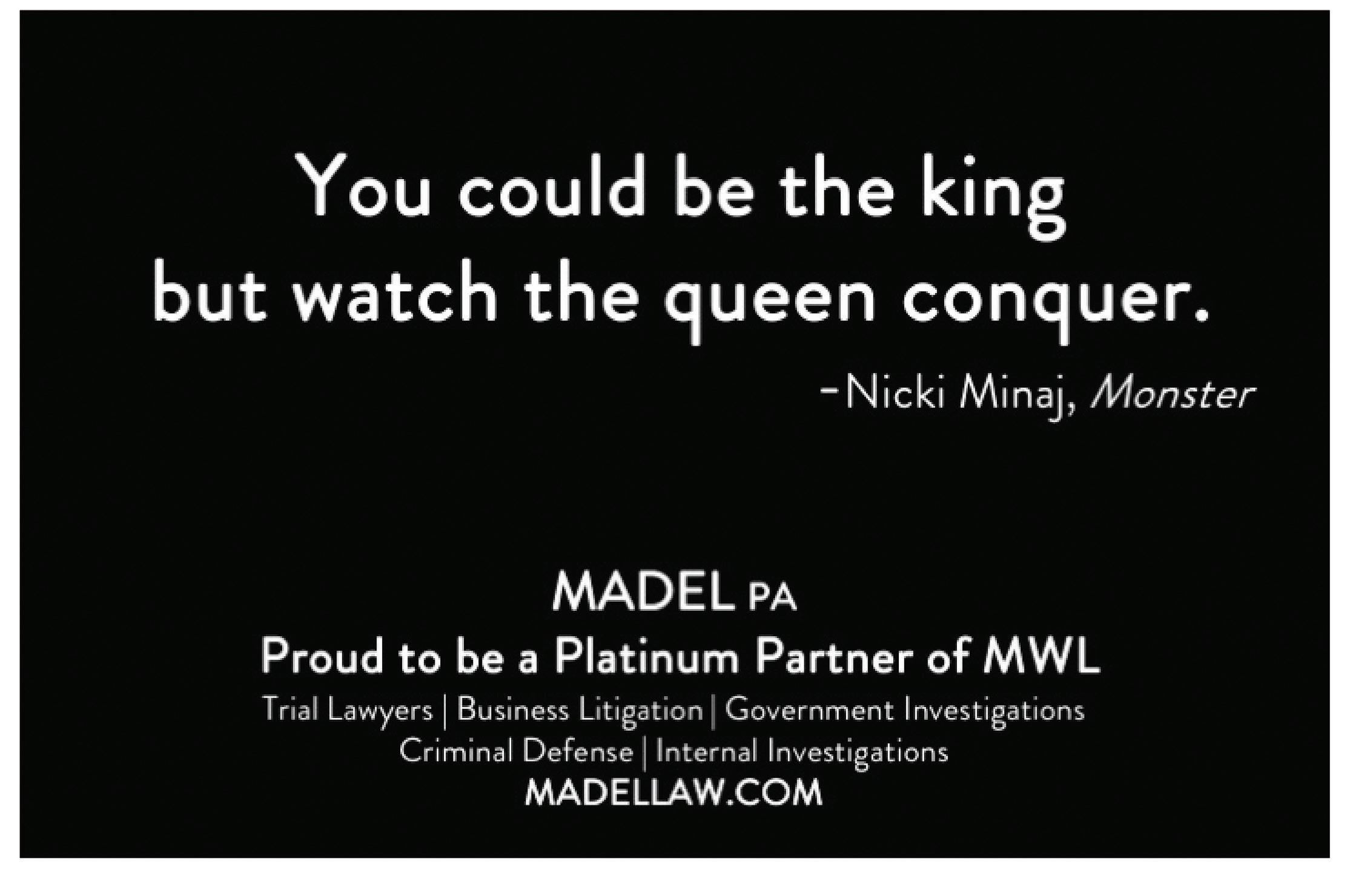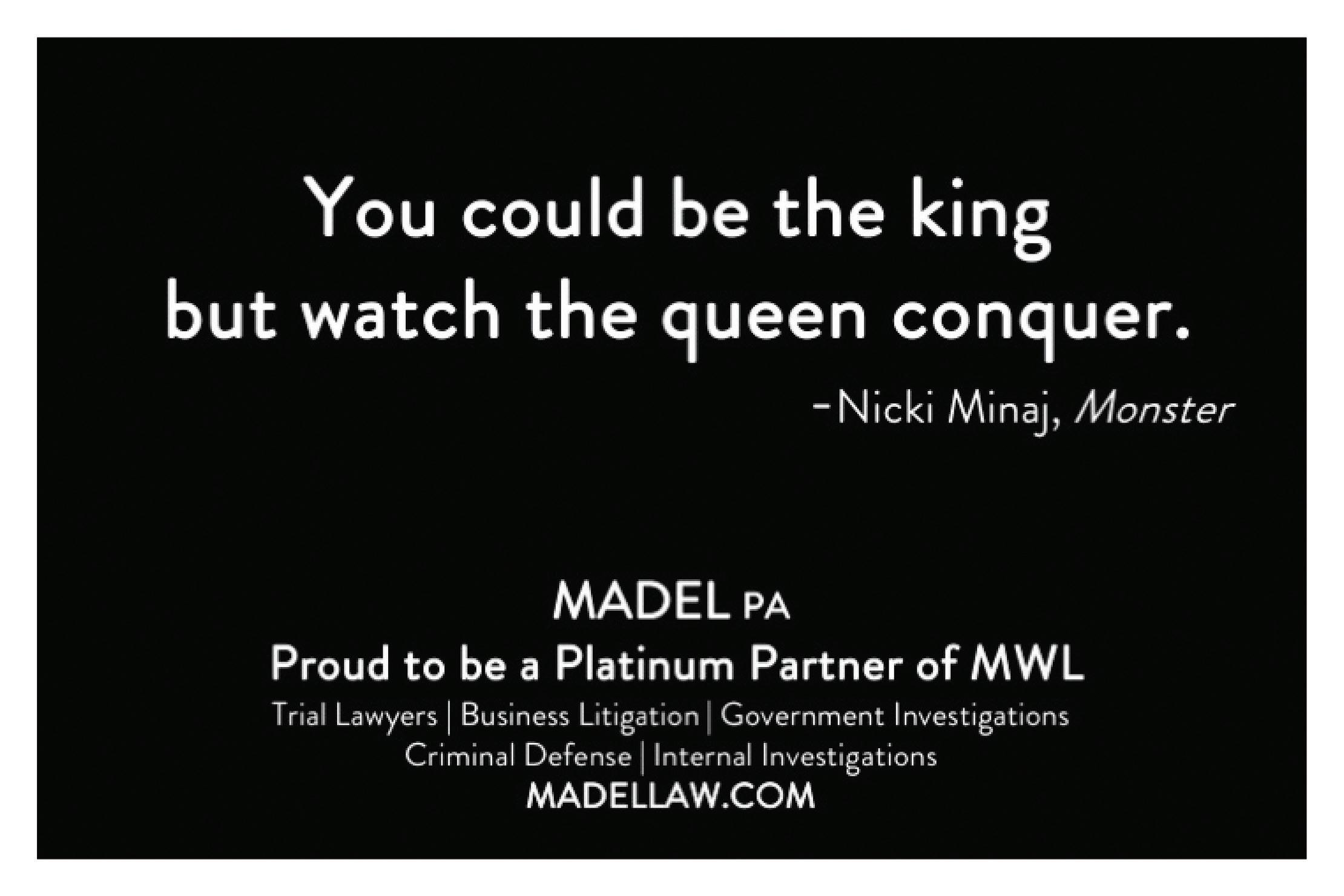
7 minute read
50 Years, 50 Voices: Jennifer Robbins
Jennifer Robbins, FY 22-23 MWL President
As MWL celebrates its 50th Anniversary, we are pleased to share the stories of 50 diverse women attorneys from across the profession and throughout the state during the coming year. Our goal is to feature individual experiences and achievements; to highlight the tremendous advancement of women attorneys across the profession (and acknowledge how much work is yet to be done); and to demonstrate the significant and meaningful impact that women attorneys have made, and continue to make, throughout Minnesota and beyond. Equally important, our goal is to learn about one another through our stories. To find commonalities, respect differences, and simply be inspired. as a Public Member of the Minnesota Board of Psychology for over four years. In that time, I felt immense satisfaction after board and committee meetings, particularly with the Complaint Resolution Committee, in knowing that after detailed preparation and what were important and often challenging conversations with other board members and licensees, I had done my best to be fair to both the licensees and to the public, and had succeeded in giving back to our State in some small way.
Advertisement
Least favorite part about being a lawyer: hands down the lack of control over my own schedule.

Jennifer Robbins Jennifer Robbins is MWL’s FY22-23 President and the Managing Partner of MADEL PA, where her practice includes representing Fortune 500 companies and individuals in high-stakes, complex matters both in civil litigation (as plaintiff and defendant), and in defending against criminal investigations and charges. She is a trial lawyer, repeat Super Lawyer, and a former Texan who has given her heart to Minnesota.
As a child or young adult, what career did you envision for yourself?
I wanted to be a marine biologist before I realized that I get seasick. Then I wanted to be a veterinarian before I realized that I would have to see animals in pain. In high school and college, my main challenge in choosing a career was how interested I was, and am, in so many different things. The word “career” sounds so final it still makes my palms sweaty.
Why did you go into law? Has your original reason for becoming an attorney withstood the test of time?
While I was in college, I did an externship for my psychology major at a halfway house for women who had been incarcerated. As a result, and following a short detour, I concluded that I might be better able to help people by working with them in the legal system rather than as a psychologist after they were already sucked into a process they did not understand. I think my primary motivation for law school—helping people in difficult situations—remains true today, and I’m grateful for those opportunities. At the same time, I have seen up close how important our mental health practitioners are not only in the legal process (before, during, and after), but so helpful to everyone for life in general. I hope that our country, and our field, can end the stigma of taking care of our mental health.
Looking back on your career, what has brought you the most professional satisfaction? What has kept you coming back to the legal profession day after day? What is your least favorite part about being a lawyer?
Things that have brought me the most professional satisfaction: seeing those who I have helped mentor or encouraged do well; having clients or colleagues trust me by referring others to me; knowing at the end of an argument or trial that I have done all I can to help my client; seeing a client turn to our team before a jury verdict and tell us that no matter what happens, they are grateful for our work—how kind is that?!? In addition to my practice, I had the privilege of being appointed to serve
What is the best advice you ever received? Who gave you that advice?
I have three pieces of “best advice” that I remind myself of all the time. First, from a college professor at the beginning of the year when my honors thesis would be due: “Don’t worry. Work.” It’s so easy to worry yourself into paralysis or procrastinate by your favorite means (mine tend to be list-making and working on other things in the hope of clearing the decks—no, they are never cleared). But it always feels better when I work on The Thing instead of worrying about The Thing.
The second and third pieces of advice both come from my mentor and now law partner, Chris Madel: “Be yourself” and “have fun.” The first time he told me to be myself I was so far down a path of not trusting myself and feeling like a fraud in a world of more senior lawyers I could never hope to successfully emulate, I was depressed, and anxiety ridden. It was shocking to be told to be myself. (This was before “authenticity” became a buzzword.) It changed my life in freeing me to find my own voice and to do my work well, as me. If not for that advice I have no doubt I would have quit law not long after.
Chris first told me to “have fun” right before my first opening statement in federal court. I don’t know what my face looked like when he said it, but inside it was pure disbelief. (Really? You’re telling me this now?) But I get it. Things can be stressful and important and fun. Every trial, he reminds me to have fun and now I remind others on our team, too. Juries have commented that they liked our team because it was clear that we genuinely like each other and our clients, even while we were clearly invested in, and working hard, for a win. Our war rooms are intense, focused, and fun. Now I can’t imagine it otherwise.
What is the worst advice you ever received? Why was it the worst?
The worst advice was from a junior (but senior-to-me) associate at my former law firm: “Never say no to work.” To be clear, her advice was not “only say no to work if your plate is already full” or “say no only to the people who make you feel like garbage.” Nope, just the blanket admonition. It still makes me angry to think new lawyers are subjected to that kind of “advice” when so many of us already struggle to say no and set boundaries to keep ourselves from burning out.
Why did you join MWL? Describe your past and/or current involvement with MWL. What impact has MWL had on you, personally and/or professionally? Is there a story you can share? (Memorable MWL moment, highlight or impact?)
I joined MWL to connect with other women attorneys but didn’t become truly invested until I participated in the MWL Leadership Project (a precursor to today’s Leadership Institute). The Leadership Project helped me identify the reasons I felt out of place in the practice of law. And, more importantly, it taught me how to use the different ways I learn, communicate, and see things to contribute value to the teams I am on. It was so validating and empowering, and one more lesson in being myself at a crucial time in my early practice.
What are your top three tips for success as an attorney?
1. Try not to take things personally—it’s easy to assume things are personal attacks when, in reality, it’s often the case that everyone is simply trying to do their job in an adversarial system.
2. Give credit where it’s due and hold yourself accountable for mistakes rather than finger pointing.
3. Make habits of staying active and nourished in the ways that keep you grounded.
On the Lighter Side...
What single word or words (1-3) best describe you?
Seeker, introvert, “neurotic empath”
If you could have any career, what would it be? (Dream career – anything!)
Writer
What’s one thing a family member or caregiver taught you that changed your life?
My dad taught me to wonder (to ask questions and to sit with awe).
What’s one thing about you that surprises people?
I love music but don’t like concerts. Sift gluten free bakery
What qualities do you most value in the people with whom you spend time?
Kindness, honesty, humor, work ethic
Do you have pets?
One of the loves of my life was my cat, Ginsburg, who recently passed away. I named him after RBG.
Favorite quote?
From a Buddhist parable: “In life, we can’t always control the first arrow. However, the second arrow is our reaction to the first. This second arrow is optional.” g



